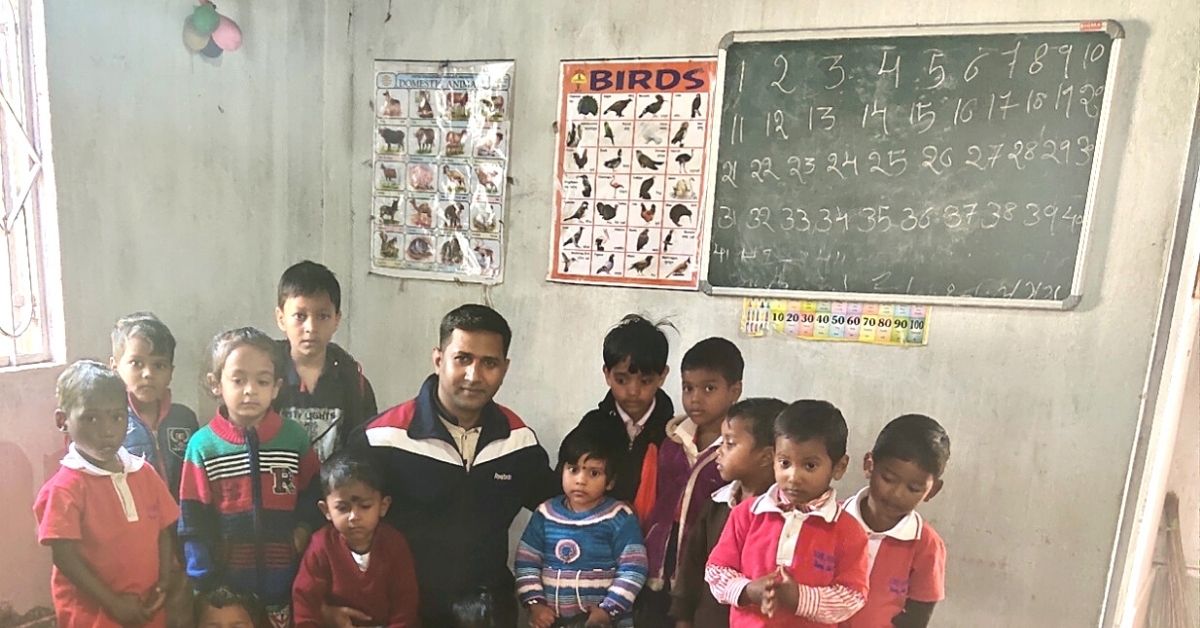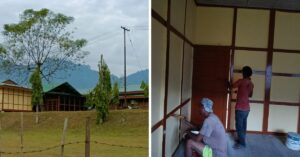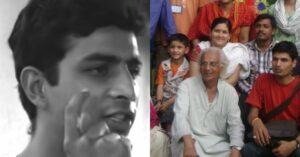Jharkhand Man Sets Up Pre-Primary School In His Village, Gives Free Lessons To Kids
Santosh Kumar Panda from Jharkhand opened the Shishu Vikash Nursery School to offer free education to 35 children of the tribal community by innovating fun ways to learn Maths, English and more

Santosh Kumar Panda lives in Chaibasa, a remote village in Jharkhand that’s surrounded by the Saranda forests and home to many members of the tribal community. Apart from the settlement of the Steel Authority of India Limited (SAIL) here, there is no urbanisation in the area. The nearest school is around 2 km away, and the tribal population’s livelihood depends on selling forest produce.
Santosh, a Class XII graduate, pursued odd jobs in Odisha to earn money and returned to his village in 2017.
Here, he took the job of a medical representative. However, he felt that much of his life had passed in search of livelihood and that he wanted to make it more meaningful. “I am 38 years old, and at that point, I felt that time was running out. I thought I have a couple of decades before I retire and that I should take steps to contribute for the larger good,” Santosh tells The Better India.
He began thinking of ways in which he could improve the lives of others. “I realised the house my father owned in the village had remained abandoned for years. My father worked with SAIL and our family lived in company quarters. Our ancestral home, however, was neglected and not maintained. Hence, I decided to open a pre-primary school for tribal children there,” he adds.
In 2017, Santosh opened the Shishu Vikash Nursery School, an English-medium institute, where over 22 children have reached the primary level, and about 35 are taking lessons in English, Mathematics, and more.
A fun way of learning

“I looked around and saw many tribal students deprived of educational opportunities. The villagers are poor and struggle to find two square meals a day. The only primary school in the area is far away, and education is never a priority among locals here,” he says, adding that children leave education at an early stage and join their parents to help them earn a livelihood.
Santosh adds that many students who try to study end up dropping out after Class I or II. “They fail to cope with the subjects as they do not know basic math or English. Often, they are not used to studying altogether. Hence, I decided to focus on building their foundations,” he says.
Santosh roped in his wife, Pravasini Panda, a former teacher, along with two more, Bharati Barua and Priyanka Muduli. “I requested them to volunteer a few hours for the welfare of the children. They agreed. We decided to run the school between 9 am and noon,” he says.
Pravasini says that around 20 students joined initially. “We introduced uniforms for students and teachers, ensured discipline and adopted a professional attitude from day one. There was no negligence on the quality of education,” she says.
She adds that the students could not follow a conventional system of learning by sitting in a classroom. “We included games and interactive teaching methods to help them learn in a fun way. We used fruits, toys, balls and other instruments. The parents of these students do not have any education themselves, so more efforts have to be taken to use practical methods of teaching,” Pravasini explains.
She adds that as time passed, parents began taking note of their children’s progress. “They began feeling confident enough to send their kids to primary schools,” she says.
‘The difference is visible’

Sanat Kumar Sethy, a resident of a neighbouring area, was among those who took notice of Santosh’s efforts and the progress these children were making. He decided to donate uniforms, books, pencils, and other study material.
“I, along with my daughter, have made the donations. I am glad to have contributed and supported these children’s education. The community has become aware and wants their children to study. This was not the case before,” he adds.
Santosh says that the COVID-19 lockdown posed a challenge, as students did not have access to smartphones, and taking online classes became difficult.
“I received a job as a grade IV employee with SAIL in 2019, which has a menial salary. We do not have funds and need contributions to pay the teachers and develop infrastructure for the school. The aim is also to start such schools in other villages. There are 52 villages in Singhbhum district, and all tribals face similar issues,” he says.
But for now, Santosh is glad to have made a difference. “It gives me joy and satisfaction to have come this far, and I will continue to work in other social causes,” he adds.
Edited by Divya Sethu
This story made me
- 97
- 121
- 89
- 167
Tell Us More
We bring stories straight from the heart of India, to inspire millions and create a wave of impact. Our positive movement is growing bigger everyday, and we would love for you to join it.
Please contribute whatever you can, every little penny helps our team in bringing you more stories that support dreams and spread hope.



















